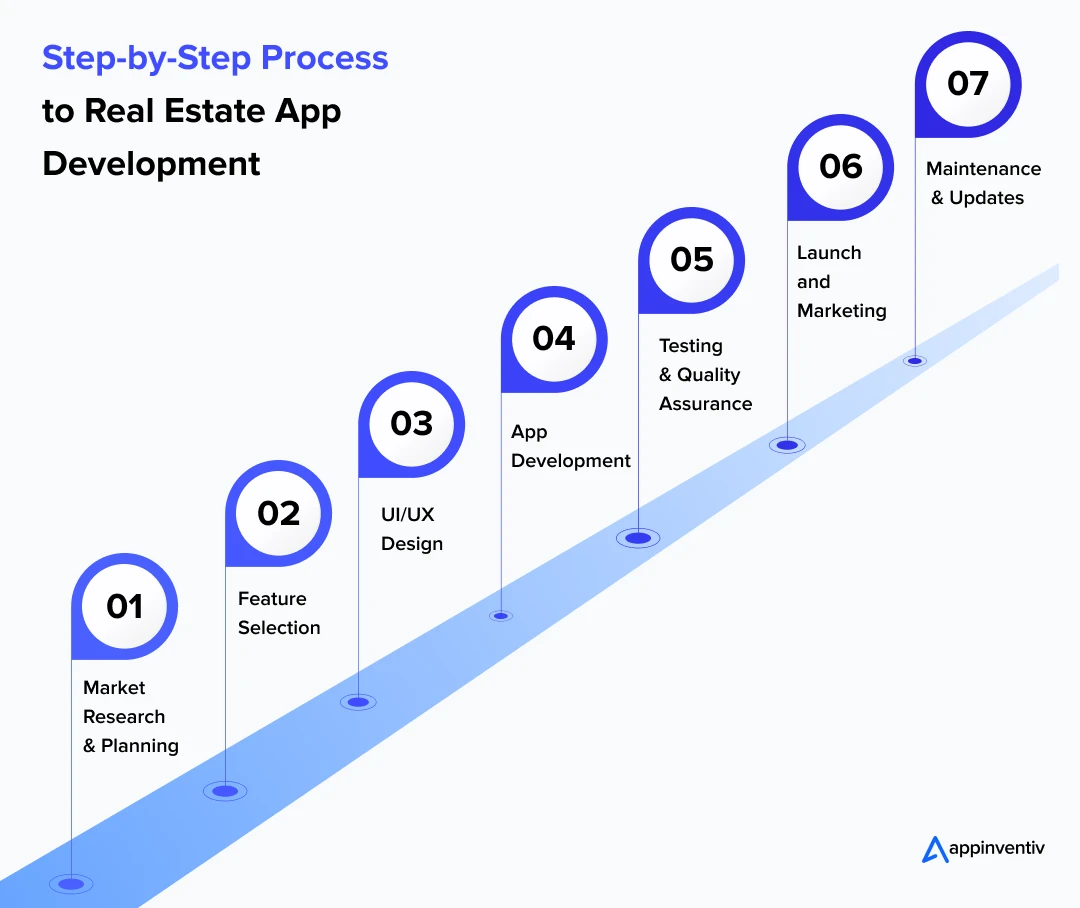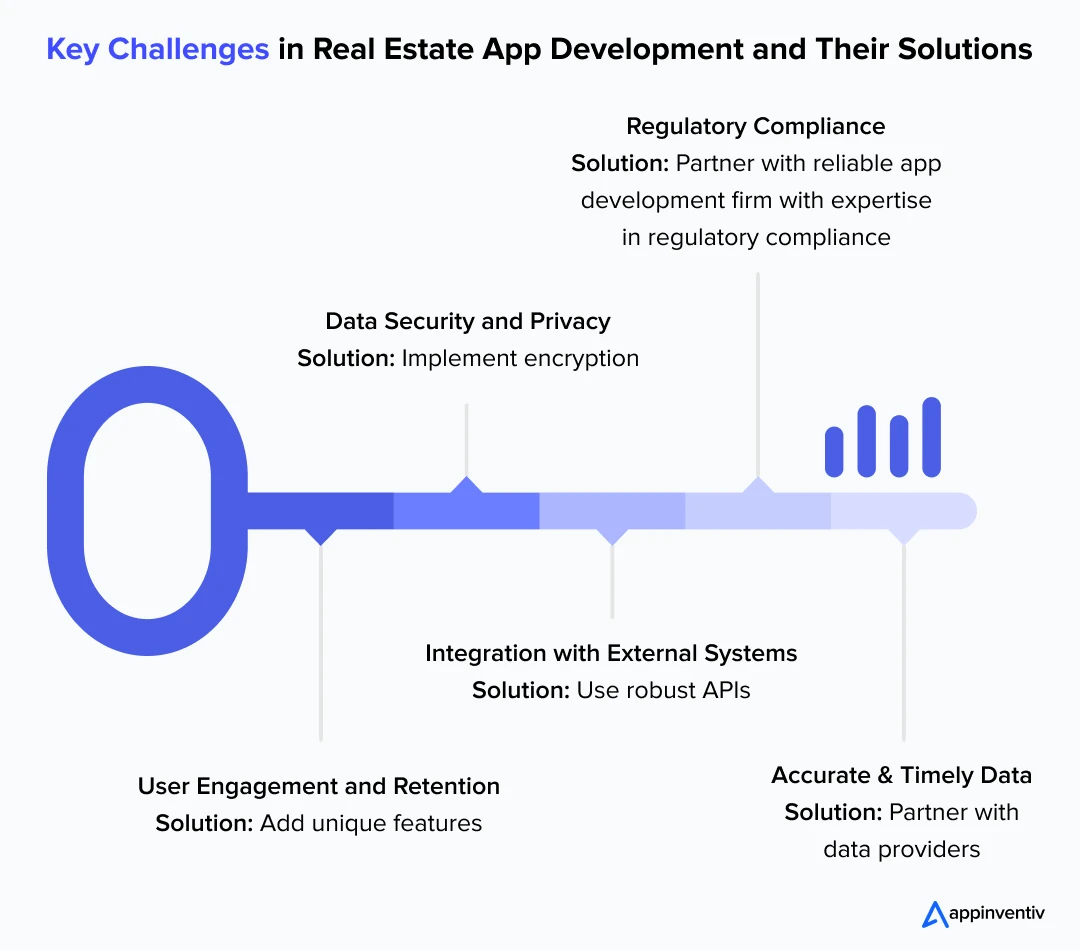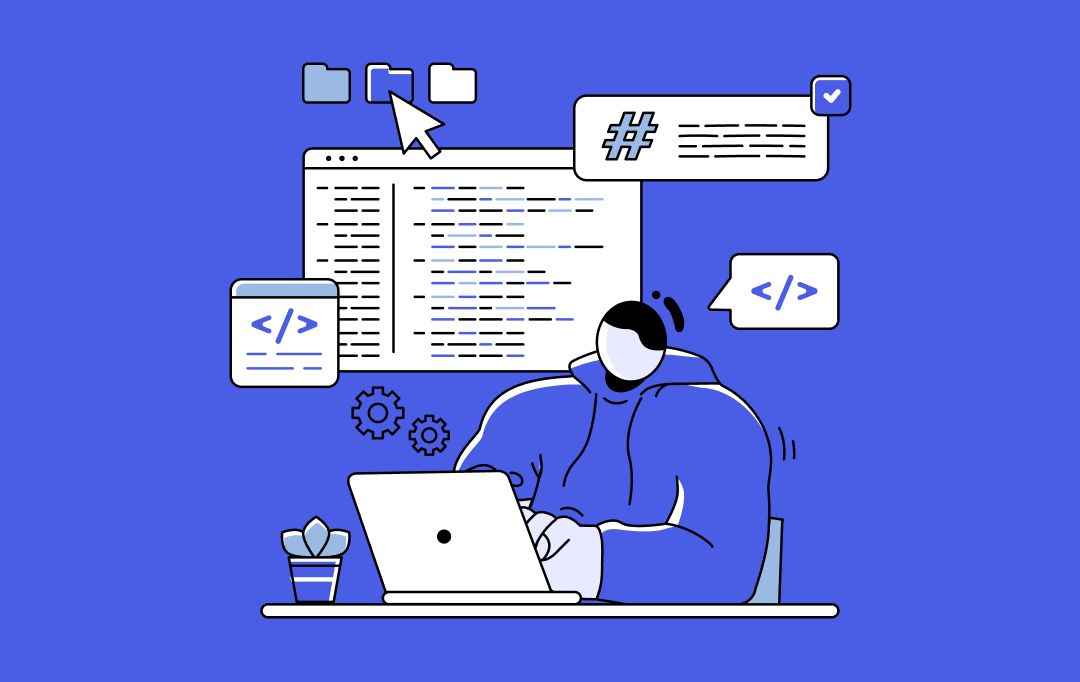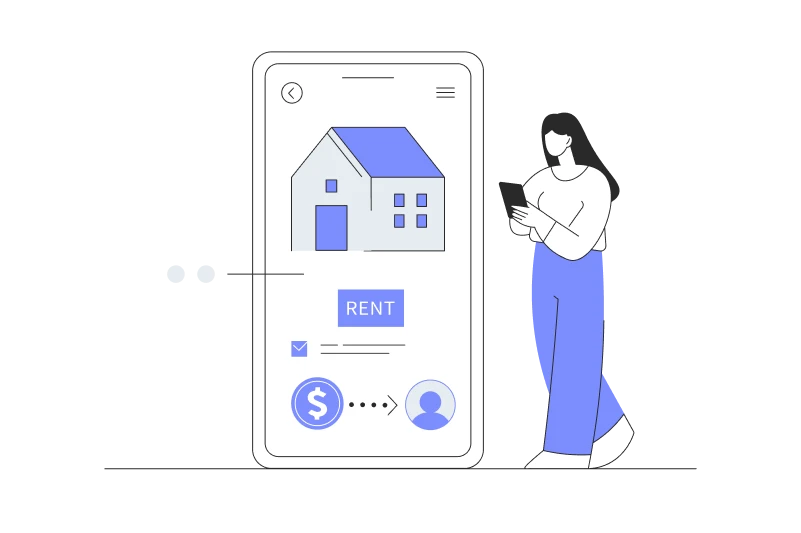- Must-Have Features of Property Search Rental Apps Like Zillow or Trulia
- Database
- User Profiles
- Onboarding
- Search, Filter, and Sort
- Interactive Maps
- Calendars
- Apartment Details
- Push Notifications
- Currency Converter
- Forum and Messenger
- Virtual Tours
- Favorites
- Technology Stack Needed for Development of Property Search Apps
- What is the Cost of Building Real Estate Apps like Zillow or Trulia?
- How to Develop an App Like Zillow or Trulia?
- Market Research and Planning
- Feature Selection
- UI/UX Design
- App Development
- Testing and Quality Assurance
- Launch and Marketing
- Maintenance and Updates
- Monetization Models to Follow in Your Real Estate Mobile App Development Journey
- How to Offer Your App a Competitive Edge in the Real Estate App Ecosystem?
- 1. Low listing fees
- 2. Give detailed information
- 3. Use blockchain
- 4. Updated MLS integration
- Risks and Challenges of Building a Real Estate Application
- 1. Data Security and Privacy
- 2. Regulatory Compliance
- 3. User Engagement and Retention
- 4. Integration with External Systems
- 5. Accurate and Timely Data
- How Can Appinventiv Help You with Real Estate Mobile Application Development?
- Conclusion
Curious about the costs of developing a real estate app like Zillow or Trulia? The average development cost typically ranges from $83,000 to $100,000, influenced by various factors such as app complexity, UI/UX design, team size, and more. This blog will help you understand these factors in detail, delve into the development process, and discuss the challenges that arise during app creation. Stay tuned for expert insights that can help you navigate the world of real estate app development.
There was once a time when people willing to buy or sell their property had to be dependent on the availability of the real estate agent’s time. The agent was solely responsible to visit properties to rent or purchase or getting prospective customers to visit their properties. Traditional practices shifted drastically since the entry of Millennials or Gen Y into the real estate landscape.
Millennials‘ entry into the property market has brought a number of changes in the industry, just like their current impact on all the other industries.
Gen Y with their famous trait of demanding everything on the move and in real–time brought the traditional and slow-moving industry on a platform, known to give them everything that they need and how they need – the mobile platform. This shift from face-to-face open houses to virtual tours on mobile has been noticed by the many stakeholders of the property market, who like millennials are demanding to move the industry to mobile.
This demand in effect has brought an increase in the property market enthusiasts who are in turn working to fill the gap between demand and supply. And it is all starting with one question – what is the cost to build a real estate app development like Zillow or Trulia?
Looking for the cost to develop a real estate app like Zillow or Trulia? We can help you navigate the process and provide a clear cost breakdown.
Before we go on any further into looking at the factors that help answer how much does an app like Zillow app or Trulia costs, let us first look at how the modern property market stakeholders have been reacting to the idea of dealing with the real estate transaction process on mobile – something that has given birth to the question how to build a real estate app like Zillow and Trulia.

The role that mobile apps play in the whole property renting, buying, and selling process has changed the whole equation of how property transactions happen. Moreover, it led to an influx of market players entering the space to attend to the transforming needs of the modern-day property buyers and sellers.
Modern property apps are leveraging AI in real estate industry to provide personalized recommendations and enhance user experience through intelligent search capabilities.
The below image exhibits the names of the top market players that have build a space in the real estate marketplace segment.

Now that we have looked into the market players that are presently ruling the property search mobile app industry, it is time to look at the real estate mobile app features at the back of which they have been able to create this place in the market.
Must-Have Features of Property Search Rental Apps Like Zillow or Trulia
A feature-rich app is likely to pave the way for success of your real estate app. There are a few features that make Zillow or Trulia what they are today. This means if you are planning to build a real estate app, you must look into the features set that you can implement to your app. A few of the must-have features are listed below:

Database
Database is one of the invisible features of your real estate app mobile application development process. A strong database will provide value leading to growth and engagement of your real estate app. The mere functioning of the app depends on the integration of the database in your real estate mobile application development process. The wider and more updated it is, the greater would be the chances of keeping users interested in your application.
Zillow and Trulia source their data from two major resources:
- National Association of Realtors
- Multiple Third-party listing services
The key to building a strong database includes collaborating with real estate traders and professionals from a particular locality to build an extensive database for your mobile application development.
User Profiles
Housing apps like Zillow are laced with such features that target different user segments only via one app. Real estate app developers must empower their end users to create their own profiles in the app. The profiles can be created based on their usability such as users, sellers, and real estate agents. It will allow different sets of users to perform different actions.
For instance, the buyer’s profile will be able to access features like listings, make an inquiry, save for later, etc., whereas, the agent’s profile will include the agent’s published listings, schedules, interested buyers data, etc.
Onboarding
The first five steps that the user takes after installing the mobile app are the most deciding ones. The easier you make it the greater the chances of users not abandoning your application on the first go.
An easy onboarding process will assist users to comprehend your app and its functionalities. You can implement an onboarding process that fulfills the three major objectives- navigation, operations, and bringing value to the eyes of the users.
For converting your user from consideration stage to successful conversions, it helps to have a social media API integrated at this stage for then onboarding becomes a matter of a few clicks.
Search, Filter, and Sort
Allowing customization increases the relevancy of your app as users will be able to filter out the best suitable properties as per their preferences like budget, location, requirements, amenities, etc. Property identification and filtration is an important feature that must be present in the real estate app design process. Real estate app developers should aim at adding as many shortlisting features as possible to increase the reliability of the platform and put your end-users at a comfort zone.
You can add search and sort filters on the basis of:
- Purpose
- Location
- Price
- Bedrooms
- Bathrooms
- Types of home
- Year built
- Built-in area
- Mortgage
Interactive Maps
Proper map integration is a very important part of any property search mobile application as it offers loads of valuable information to the end-users. It is your only way to ensure that the property seekers reach the right location at the right time.
In fact, you should also aim for integrating a smart map feature in the application, which would help in identifying what all places are in the vicinity. You can showcase useful data and statistics about nearby places such as schools, banks, hospitals, the average income of residents, crime rate, etc.
Calendars
Many realtors believe that a calendar is just another optional feature; however, it makes your app highly appealing. The feature comes in handy, especially for the real estate agent side of the stakeholders. For instance, if a buyer wants to schedule an appointment with agents, they can easily get the available dates and time slots for scheduling the appointment via the app. Similarly, in the case of open houses, they can easily keep track of the open house and property buyer/seller meetings.
Apartment Details
Each property listing is full of information like description, videos, photos, price details, landmarks, nearby areas, owner details, etc. Your platform would be considered to be truly effective only if you give in-depth insights into every property that is listed in the app. Everything from per sq. ft. area to the locality and contact person details should be clearly mentioned the app. Having the details of the property clearly in the app increases its value in the market as a whole.
For instance, Trulia has data on 34 neighborhoods, including photos, videos, amenities, and stories of the local residents. This feature incites interest in potential buyers as they can understand the community or neighborhood better.
Push Notifications
Push notifications are a highly powerful marketing tool. The benefits that rightly applied push notifications offer are too big to ignore. This feature allows you to stay at the top of the customer’s minds and retain them. What applies for mCommerce apps works rightly for property search applications too. By installing the push notification feature in the app, you will be able to keep the users updated in terms of the message that they receive or price fluctuations and even receive an update on the calendar appointment.
Currency Converter
With everything now operating in a one–world scenario, the cross–border movement of people has brought with it the need for cross–border real estate purchases as well. In such situation where more people are opening to the idea of owning or renting a property wherever they reside, it’s a must to have a currency conversion functionality in the application, as any real estate mobile app builder team would suggest.
Forum and Messenger
Having the forum functionality in the application will allow your users to discuss the property, its condition, profit-making ability, etc. in open. Something like an embedded chat system would directly increase your app engagement rate. The inclusion of messenger functionality, will give your stakeholders a platform where they can converse with each other and expedite the whole real estate transaction.
Also, an embedded call or chat system will let users close a deal by contacting a real estate agent directly via the app.
Virtual Tours
Post pandemic, virtual tours are becoming mainstream for real estate apps. Technologies like AR/VR play an essential role in promoting virtual tours and enables end–users to virtually visit the property before they make the purchase. In the current digital landscape, it can do wonders to your turnover. Virtual tours can be an amazing way to turn app visitors into potential prospects who would actually like to connect and invest in the property. Virtual tours can have a huge impact on your real estate app revenue model and engagement.
Favorites
Suppose you are looking for a property but immediately don’t want to take the final action. You would want to explore the other options or consult with your family members before making any decision. But what happens if you exit the app? You might have to start your research once again, but what if you can save them for later.
Saving your later is possible with the favorites feature that works well for any real estate app’s success. Your end-users can easily shortlist their preferred properties using this feature. This feature helps your users in their buying-selling process and empowers them to view their shortlisted properties anytime and anywhere.
Other advanced features that decides your app’s success includes multiple listing services, behavior tracking, mortgage or interest rate calculator, etc.
Now that we are familiar with the must-have range of features in a real estate app, it’s time to look into the technology stack required to develop a mobile app for a real estate company.
Technology Stack Needed for Development of Property Search Apps
Technology stack plays a crucial role in creating an app for real estate companies. To implement the features mentioned above, you need technologies to make your app robust and fast. Below, we have listed technologies that real estate app developers use to build top real estate apps.
| Platform | Technology/Tools |
|---|---|
| Application Designing | Adobe Photoshop and Canvas Flips |
| iOS Application Development | Swift/Objective C, Mac OS, iPhone SDK |
| Android Application Development | Java, JDK, SQLite, Kotlin |
| Backend Development | PHP, MySQL |
| Video Calling API | Twilio |
| Database | CoreData or Realm frameworks, The Onboard Informatics Community |
| Database | Zillow app API, MapBoxGoogle Maps APIs, SimplyRets, iHomeFinder, Spark APIs, Spatial Neighborhood APIs, Google Places API |
| SDK files | Firebase SDK, Facebook SDK |
What is the Cost of Building Real Estate Apps like Zillow or Trulia?
The cost of developing a real estate app like Zillow or Trulia depends on the various factors associated with it. A few of them are complexity of the app, development team size, location of the hired development agency, etc.
If your property search app will also operate the same set of features like those listed above along with the same set of the technology stack that we shared a while back, then your cost of Zillow like app development would come somewhere in the range of USD 83,000 to USD 1,00,000.
*Now, this is the basic most range settled on after analyzing the features and technology stack set we shared above. Any modification in the sets would automatically affect the cost one way or the other.*
Before investing your whole budget into the app development, you can get an MVP developed and validated to stay on the right path of your app development process. Now, that you got your app developed, it’s time to look into the monetization methods from which you can get your app developed.
[Also Read: How much does it cost to build a property and lease management software]
How to Develop an App Like Zillow or Trulia?
Developing a real estate app like Zillow or Trulia involves careful planning and execution to create a functional and user-friendly platform. Such apps not only help users explore real estate listings but also provide tools for buyers, sellers, and real estate professionals to connect and interact. Here’s a step-by-step guide to real estate app development:

Market Research and Planning
Begin by conducting thorough market research to understand the needs of your target audience and identify the features most in demand. This phase should also include analyzing competitors to find gaps that your app could fill.
Feature Selection
Decide on the key features your app will offer, such as property listings, search filters, maps integration, user profiles, and communication tools. Prioritize these features based on user demand and development resources.
UI/UX Design
Focus on designing an intuitive and appealing user interface. The design should facilitate an easy navigation path for finding properties and include interactive elements like photo galleries and virtual tours.
App Development
This is the coding phase, where developers build the app’s functionality based on the chosen features and design. It typically involves front-end and back-end development, ensuring the app works smoothly across different platforms and devices.
Testing and Quality Assurance
Test the app thoroughly to identify and fix any bugs. Testing should cover all aspects of the app, including performance, usability, security, and compatibility with different devices and operating systems.
Launch and Marketing
Once the app is tested and ready, launch it on the appropriate app stores. Accompany the launch with a strong marketing campaign to gain visibility.
Maintenance and Updates
After the launch, continuously monitor the app’s performance and gather user feedback. Regular updates and new features will be necessary to keep the app relevant and useful for its audience.
Monetization Models to Follow in Your Real Estate Mobile App Development Journey
There are multiple ways through which real estate based property listing apps make money. Here are some which we advice our clients:
- Sell Ad Slots to Property Management Companies
- Premier Service Offering to the Real Estate Agents
- Sell Ad Slots to Mortgage Lenders and Similar Businesses
The money you spent on answering the question How to Make a Real Estate App Like Zillow and Trulia and the money you have the potential to earn will never arrive at a stage where the real estate app development cost is covered with the profits until you establish a place for yourself in the slowly crowding mobile space.
How to Offer Your App a Competitive Edge in the Real Estate App Ecosystem?
Knowing how to be better or simply have a competitive edge strong enough to stand atop the growing crowd of active real estate players entering the app segment.
There are a number of things that you can think of in terms of bettering the user experience and a number of features that you can add to make the experience more value–wise profitable. At the back of our experience of developing multiple real estate housing apps like Zillow and Trulia as the leading real estate mobile app development company, we have identified these functionalities whose addition to the mobile app can give your app brand the competitive edge it needs to survive.

1. Low listing fees
The number one thing that generally keeps realtors and advertisers jumping between one real estate app to another is the listing fees. While it is completely unprofitable to waive off the listing fees entirely you should instead keep the fees low in relation to other applications active in the market. You can even have an inauguration waiver wherein you don’t charge any fees from the users for a set period of time.
2. Give detailed information
Another thing that you can do to make your app more than a property listing platform and convert it into a go-to platform for people looking to buy rent or sell a property is by giving them in-depth information into the locality, security, the mode of conveyance around the area, market valuation of the area, prospect of growth after a few years, etc.
3. Use blockchain
Although at a low adoption rate, Blockchain technology is already in many ways changing the real estate outlook across the world. Being one of the top technologies disrupting the real estate sector, the technology is poised to become a concrete answer to how to make an app like Zillow app.
In order to establish yourself as a disruptive market player, you can integrate the technology into your real estate app. There are a number of elements that you will be able to decentralize with Blockchain technology inclusion in the app, like property verification, name transfer in property documents, etc.
4. Updated MLS integration
One of the biggest complaints that the users have even from the popular real estate apps is that the data which have been fed in the app is outdated. Half of the time either the property listed is already sold out or the price range mentioned on the app is outdated. The solution to this consistent problem is better integration with MLS. The more closely knit you keep your app with the MLS, the more updated and real-time your app would be.
Risks and Challenges of Building a Real Estate Application
Building a real estate application comes with its set of risks and challenges that need careful consideration and strategic planning. Addressing these effectively can significantly enhance the app’s success and user satisfaction. Here are some common challenges businesses need to know of:

1. Data Security and Privacy
Real estate apps handle a lot of sensitive user data, including personal and financial information, which makes them a target for cyber threats.
Solution: Implement robust security measures such as encryption, secure data storage, and regular security audits to protect user data and build trust.
2. Regulatory Compliance
The real estate industry is heavily regulated, and apps must comply with local and international laws, which can vary significantly.
Solution: Work with a dedicated app development firm with experience in developing similar applications. They have a clear understanding of the regulatory requirements of the market the app will operate in and will ensure all the features comply with these laws.
3. User Engagement and Retention
With many real estate apps available, keeping users engaged and ensuring they return to your app is a major challenge.
Solution: Introduce features that add value beyond basic listings, such as mortgage calculators, interactive maps, or personalized alerts for property matches to keep users coming back.
4. Integration with External Systems
Real estate apps often need to integrate with various external systems for listings, CRM, or analytics, which can complicate development.
Solution: Develop reliable APIs and ensure your development team has experience in integrating diverse systems smoothly to provide a seamless user experience.
5. Accurate and Timely Data
Providing users with accurate and updated property listings is crucial but challenging due to the fast-moving nature of real estate markets.
Solution: Partner with reliable data providers and develop efficient backend systems that can regularly update and verify the accuracy of the data displayed.
How Can Appinventiv Help You with Real Estate Mobile Application Development?
Appinventiv, a leading real estate mobile app development company has helped various clients of the same domain in delivering successful mobile apps. The team of innovative real estate app developers specializes in the development of property apps that are powered by disruptive technologies prepared to meet the present and future demands of all your stakeholders in real-time.
We have collaborated with leading brands such as Empire hotels, Adidas, IKEA, and many more. Our expert team can help you connect all your stakeholder’s requirements- buyers, sellers, and aggregators in one app.
Conclusion
We hope you got a complete overview of the real estate app development cost and other important things associated with it. Whether it is a real estate app for Android or iOS, it’s always targeted to ease the buying, selling, and renting process for the end-users. Make sure to implement a simplified dashboard to manage profiles. An intuitive UI in your real estate app will define its success in the long journey. To stay ahead in the market, understand what Zillow and Trulia app delivers and continually upgrade features to deliver an unparalleled app experience.
FAQs
Q: How much does it take to build an MVP for a real estate app?
A: On average, it takes 3-4 months to develop and release an MVP. However, the time period might increase or decrease based on the features you are looking to integrate to your real estate MVP.
Q: How to build a real estate app?
A: Building a real estate app involves several key steps:
- Research: Understand the market and user needs.
- Features: Decide on essential features like listings, search filters, and user profiles.
- Design: Focus on a user-friendly design that enhances the user experience.
- Development: Develop the app with robust back-end and front-end programming.
- Testing: Conduct thorough testing to ensure functionality and security.
- Launch: Release the app on platforms and promote it to reach potential users.
- Maintenance: Continuously update and maintain the app for optimal performance.
Q: How much does it cost to make a real estate app?
A: The cost of developing a real estate app can vary widely depending on several factors. Typically, prices can range from $83,000 to $100,000 or more. Factors that influence the cost include the complexity of the app, the number of features, the platform, the design specifics, and the expertise of the development team. Opting for more advanced features or higher-end design elements can significantly increase the budget.
Q: What are the latest trends in real estate app development?
A: The real estate app market is constantly evolving with new technologies and trends:
- Virtual and Augmented Reality: Allowing users to tour properties virtually.
- AI and Machine Learning: For personalized property recommendations and predictive analytics.
- Blockchain: For secure and transparent transactions.
- Internet of Things (IoT): Smart home integration for better property management.
- Sustainability Tracking: Features that monitor and promote energy-efficient properties. These trends are shaping the future of real estate apps, making them more engaging, secure, and user-friendly.
Q: How does a real estate agency benefit from having a personal mobile app?
A: A personal mobile app for real estate companies brings multiple benefits to the table. The company becomes a part of the major growing market share. The real estate market is huge and more users are visiting your website or app each day. With the right analytics tools, you can analyze user data to capture potential leads. Also, you become one of the prime agencies that are always open to take queries and schedule property visits- all through your app.
Q: How blockchain technology can help in the real estate business?
A: Real estate businesses can leverage the growing blockchain technology by implementing it in different areas of real estate such as
- a smart contract
- a decentralized and immutable ledger
- in the form of cryptocurrencies


- In just 2 mins you will get a response
- Your idea is 100% protected by our Non Disclosure Agreement.

How Much Does It Cost To Build a Chat App Like Arattai?
Key takeaways: Creating a chat app like Arattai will cost you anywhere from $40,000 to $400,000, depending on how complex you want it to be. The essential features you need are real-time messaging, multimedia sending, and user authentication. Layering advanced features such as voice/video calls, group messaging, AI-driven bots, and end-to-end encryption takes the app…

How Much Does It Cost to Build a Car Rental App like Hertz?
Key takeaways: The cost to build a Hertz-like app ranges roughly $40,000–$300,000+. Complexity, automation, and scale matter more than just the number of features. Real costs continue after launch: infra, maintenance, support, and compliance. Smart planning and MVP-first approach help keep budgets under control. Revenue comes from rentals, add-ons, subscriptions, partnerships, and fleet sales. You…

How Much Does It Cost to Build a Banking App like Barclays?
Key takeaways: Barclays sets the bar: Its speed, security, and money management tools show what EU users expect from modern banking apps. Costs vary a lot: A basic, compliant app can start around $40,000 (≈€30,000), while a feature-rich build can reach $400,000+ or more (≈€298,000+). Rules add real work: Meeting PSD2, GDPR, and instant payment…





































